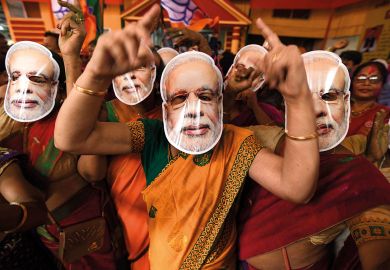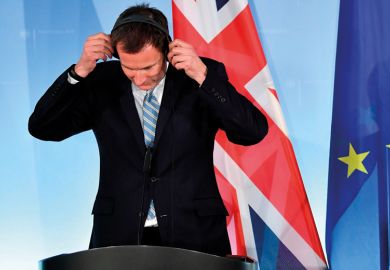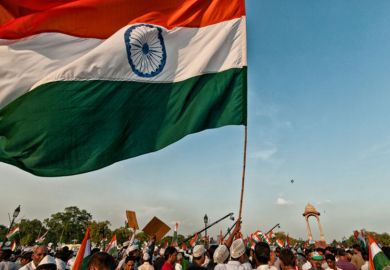An Australian university’s policy institute, which has been deserted by research affiliates over perceptions of political interference, faces being supplanted by “a new high-profile body” without university ties.
The threats circling the University of Melbourne’s Australia India Institute (AII) exemplify the difficulties facing thinktank-style centres in universities – particularly if their researchers’ objectives conflict with those of their funders.
In March, Australian foreign affairs minister Marise Payne committed A$8 million (£4.5 million) towards a new Centre for Australia-India Relations that will function as “a centre of gravity for the bilateral relationship”. Its mandate includes “promoting policy dialogue”, “deepening cultural connections” and “engaging Australia’s Indian diaspora communities” to support the relationship.
The centre will also receive more than A$20 million to administer “friendship” initiatives including scholarship and fellowship programmes. It appears to duplicate much of the work of the AII, which was established with an A$8 million federal grant in 2009 to “strengthen bilateral relations” amid a furore over violence against Indian students in Melbourne.
Ms Payne said that the Department of Foreign Affairs and Trade (DFAT) would “consult broadly” over the new centre, which is expected to open in early 2023. DFAT and the AII both declined to say whether the institute would be involved in the consultations.
DFAT also declined to say whether the Melbourne institute would continue to receive federal funding, although a spokeswoman said that the new centre would “complement the work of existing India-focused institutions in Australia”.
The developments coincide with Canberra’s efforts to strengthen ties with India as an alternative to China, which is Australia’s major trading partner but increasingly perceived as a security threat. Australia recently updated its India Economic Strategy and signed a new trade deal. “The Australia-India relationship is at a high point,” according to a DFAT fact sheet.
Such reflections differ from the preoccupations of more than a dozen AII research affiliates who quit the institute in late March over claims that it was downplaying their efforts to highlight issues such as Hindu nationalist violence, India’s oppression of minority groups and the muzzling, incarceration and even assassination of activists, journalists and academics, including a former vice-chancellor.
China-Australia relations expert John Fitzgerald said it was unlikely that the government had decided to bankroll a new India centre because it was irritated with the human rights focus of researchers affiliated with the AII. Rather, Canberra had probably decided that the thinktank model offered “better bang for buck”, producing more timely and relevant reporting and research.
“If that’s the case, I’m guessing that Melbourne will try to restructure its institute like a thinktank, which would irritate a lot of people," Professor Fitzgerald said. “The question arises: do thinktanks belong on university campuses or as part of a university administration? University researchers need the freedom to go wherever the inquiry takes them. Thinktanks work to a mission, and that mission is not academic freedom.”
Professor Fitzgerald, the former head of the Asia-Pacific philanthropy studies programme at Swinburne University of Technology, said thinktanks, as much smaller organisations, also had the advantage of nimbleness. “Thinktanks tend to be able to focus more quickly, spot where the financial benefits lie and to go for them. It takes universities far longer to do that – and when they do, far longer to process it.”
Register to continue
Why register?
- Registration is free and only takes a moment
- Once registered, you can read 3 articles a month
- Sign up for our newsletter
Subscribe
Or subscribe for unlimited access to:
- Unlimited access to news, views, insights & reviews
- Digital editions
- Digital access to THE’s university and college rankings analysis
Already registered or a current subscriber?








